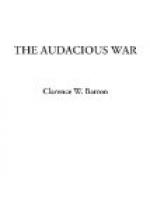A journalist friend just arrived from Berlin in this month of February tells me he detects a general policy in Germany to direct the national spirit solely against England, possibly with a view to bringing the German people into line for proposals of peace with everybody else. The sentiment of Germany is being swung to-day, just as it has been from the beginning under the present Kaiser, against England as the real and only enemy to a German world-conquest.
Punch says the Germans spell “culture” with a K because England has command of all the “C’s.” But the English-speaking race has also command of the biggest letter in the alphabet, and can say damn with a force surpassing expression in any other language. The most popular song to-day in Germany is the “Hymn of Hate,” by Ernest Lissauer, whom, it is reported, the Kaiser has decorated for this—the only real German literature from the war. It is a hymn and chant, and has rhythm, hiss, and fight in it. It runs to the sentiment,—
“French and Russian, they matter
not,
A blow for a blow, a shot for a shot,”
but ends,—
“We love as one, we hate as one;
We have one foe, and one alone—
England!”
And when that last line and that last word burst from thousands of German throats, as in the crowded cafes of Berlin, it is the fullest German damn that can find expression in German consonants. I believe the Prussians of Berlin would be as pleased to megaphone that line from Calais to Dover as they would be to throw their first shell across the English Channel. But if enforced international law did not permit them to strive for that shot as the expression of their passion, they would soon forget their hot hate and put their shoulder again beneath the progress of the world.
Man has come up from the dug-out or the cave where in primordial condition he won his food by his own hands from the uncut forests and the unfarmed waters. As family policeman he had no incentive to accumulations of food, clothing, or luxuries. These involved added police responsibilities and enlarged the temptations of his neighbors, both men and animals.
Later, his family becomes a tribe. In combination the duties of protection for the common good take on a larger view. The village, the walled city and the armed state naturally follow. Each stage of communal growth reduces the number of men set apart for defence or police duty. There is a corresponding increase in the common store of human possessions and human happinesses.
From states grow nations, then empires, until but a small fraction of the people is engaged in any way in aggressive or defensive warfare, or even police work or the determination or enforcement of laws of justice as between individuals, cities, states, or communities of any sort.




